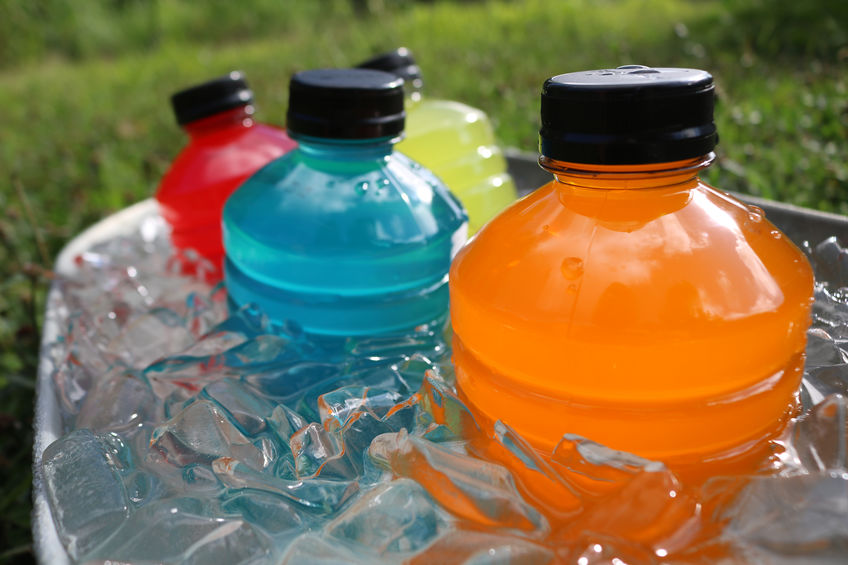Sports drinks are popular training aides, but they may not be the best form of hydration for general recreational activities. Why do so many individuals think these drinks are the best option? Mostly, smart marketing and savvy promotional efforts by the manufacturers increase the appeal (Orru et al., 2018).

Whether to drink water or sports drinks before, during or after exercise often depends on the type, duration, and intensity of the activity. However, it’s common for fitness clients to choose a sports drink as their go-to hydration solution.
What’s in a sports drink?
Contents will vary by brand, but a sports drink typically contains a form of simple carbohydrates, potassium and sodium, and water – all necessary elements for sustained, high-intensity activity.
Water hydrates; electrolytes enhance the absorption of water and glucose, and assist in maintaining blood volume; carbohydrates provide energy for activity (Orru et al., 2018). All positives. BUT there’s a caveat to consumption.
When to consume a sports drink?
Activities lasting less than 60 minutes do not generally require the consumption of a sports drink as a re-hydration tool. However, research has long supported the use of sports drinks for exercise lasting over 60 minutes and especially among athletes.
When compared to water, sports drinks can significantly boost an athlete’s endurance due to the carbohydrate concentration and electrolyte balance. During practice or competition, an athlete loses fluid (water and electrolytes) through the processes of sweating and breathing (Stachenfeld, 2014).
After prolonged exercise (2-4 hours of continuous exertion), electrolyte and carbohydrate replacement become crucial; hot weather also increases the need for electrolyte and glucose replacement. Dehydration and energy depletion will negatively impact an athlete’s performance. In order to offset the impact of heavy exercise, sports drinks and/or gels are used to replenish what is lost to allow the athlete to successfully complete the event.
Another benefit of sports drinks is the wide variety of flavors available, which may entice the athlete to drink more fluids and avoid a dehydrated state.
While certain sports drinks offer many benefits to those who engage in heavy, prolonged activity, they are not always the best or healthiest choice for the recreational individual. The growing popularity, availability, and variety of sports drinks have influenced individuals to consume these products on a daily basis – even during sedentary activities. Generally, consuming sports drinks during non-active times is not cause for alarm; however, being aware of the quantity and calories being consumed is wise.
Consuming Sports Drinks Mindfully
Depending on the brand of sports drink, a normal 32-ounce beverage contains four, eight-ounce servings and has 50 calories per serving. In addition, each eight-ounce serving contains 14g of sugars and 110mg of sodium. If one were to consume the entire 32-ounce beverage, he or she could take in an excess of 200 calories, 56g of sugar, and 440mg of sodium. Now, those numbers are alarming!
If you have clients hooked on sports drinks, try using some of these tips with them to build beverage awareness.
- To effectively manage portions, pour single servings (8 ounces) of the beverage into smaller cups.
- Mix half a serving with cold water and ice. This reduces the sugar and calories and still gives water flavor.
- Consume adequate amounts of water throughout the day before enjoying a few sips of another beverage. Water is often the best hydration tool.
- Help your client evaluate why consuming sports beverages is so appealing. If it is simply because water seems bland, try making your own “sports drink” by using fresh fruit to flavor water or combine part real fruit juice with cold water and green tea. Take it an extra step and blend the drink for a “slushy-like” treat.
For our fitness clients who wish to maintain a reasonable caloric intake and manage (or even lose) body weight, drinking sports beverages on a daily basis can potentially derail that goal. This is not to say that sports drinks cannot be part of a balanced diet. But in order for that to be true, we need to help our fitness clients develop awareness about the contents of the drink so that they are consuming them mindfully instead of habitually.
References
Kovar, E. 2016. Exercise myths vs. reality. Retrieved from https://www.acefitness.org/education-and-resources/lifestyle/blog/5974/exercise-myths-vs-realities
Mayo, J. and Kravitz, L. (n.d.). Sports and energy drinks: Answers for fitness professionals. https://www.unm.edu/~lkravitz/Article%20folder/sportsdrinksUNM.html
Orru, S., Imperilini, E., Nigro, E., Alfieri, A., Cevenini, A., Polito, R., Daniele, A., Buono, P., and Mancini, A. 2018. The role of functional beverages on sport performance and recovery. Nutrients, 10(10), 1470.
Stachenfeld, N.S. 2014. The interrelationship of research in the laboratory and the field to assess hydration status and determine mechanisms involved in water regulation during physical activity. Sports Medicine, 44, 97–104.
https://www.uwhealth.org/nutrition-wellness/sports-and-energy-drinks-are-they-necessary/32551
www.acefitness.org/educatin-and-resources/lifestyle/blog/5974/exercise-myths-vs-realities
https://www.unm.edu/~lkravitz/Article%20folder/sportsdrinksUNM.html
https://www.uwhealth.org


